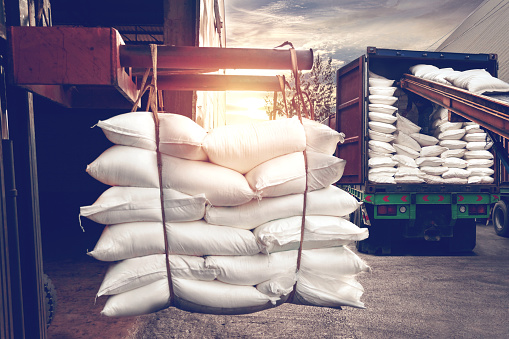Brexit: UK to introduce new Import Control System from 2024
The British government has already postponed the introduction of a new border control system for imports from the EU five times since Brexit. The Import Control System came into force on 31 January 2024. But what does the new system mean for German companies and their exports to the UK?

Already since the end of the Brexit transition period on 31 December 2020, it has been expected that the UK would introduce full border controls on imports from the EU, essentially in line with existing rules for imports from other countries. Despite repeated announcements, this process has not yet been implemented due to fears of negative economic consequences for UK businesses and disruption to goods supply chains. Therefore, while exports of goods to the EU have been subject to full EU border controls since 2021, the same does not apply to imports of goods from the EU. With the introduction of the new Border Target Operating Model in 2023, the same customs rules will apply to all imports, regardless of the country of origin. The existing provisions on the movement of goods between Northern Ireland and the Republic of Ireland will remain unaffected.
The new Border Target Operating Model
The newly developed model is considered to be the conclusion of the process that has been underway since April 2022 to introduce full customs controls for all goods traffic with the EU. An essential component is new requirements to digitally transmit customs documents to the customs authorities in the future in order to streamline processes, simplify import controls and reduce costs and expenses for companies; similar to the ICS2 in force on the EU side.
What currently applies to EU imports and what will change?
In principle, the same provisions apply as for all other countries, but with two exceptions:
- So far, no entry summary declarations have to be submitted.
- Health certificates and health checks are not required when importing agricultural and food products.
Both exemption rules will be dropped with the new system and new additional documentation and control obligations for imports will be introduced. In addition, all information relevant to customs must be transmitted digitally in future; in the case of agricultural and food products via the IPAFFS system (Import of products, animals, food and feed system) with a deadline of 48 hours before presentation to customs.
Changeover in three steps
The changeover to the new system is planned in three stages by the end of 2024, a timetable that is considered ambitious by British business representatives and logistics associations. However, the domestic political pressure on the government to finalise the issue continued to increase, particularly due to the 2024 general election.
- 31 January 2024 – Introduction of health certification for imports of animal products, plants, plant products and food (and feed) of non-animal origin with medium risk from the EU.
- 30 April 2024 – Introduce documentary and risk-based identity and physical checks on high-risk animal products, plants, plant products and food (and feed) of non-animal origin from the EU.
- 31 October 2024 – Entry summary declarations for EU imports come into force. In parallel, a reduced data set for imports is introduced.
New risk groups for agricultural and food products
With the second level, agricultural and food products are classified into risk groups: low, medium and high. From the categorisation into one of these groups, the impact depends on the type of goods. For low-risk goods, the import burden is generally reduced. However, if there is a suspicion of an increased risk, examinations can be ordered, and health certificates requested. European companies exporting products from this category to the UK will therefore benefit from the new regulations.
Medium- and high-risk goods, on the other hand, will be subject to stricter import regulations, which will increase the effort required for exports to the UK compared to the current import regulations. Medium-risk products will not only be subject to new health checks and identity controls from 31 January 2024. Importers will also have to submit a health certificate issued by the competent authority in the country of origin of the goods. This category includes in particular meat, dairy and fish products.
Individual products considered to pose a high health risk are already subject to health, identity and physical checks. However, the list of products in this category has been significantly expanded by 30 April 2024.

Impact on groupage traffic for agricultural and food products
In groupage transport, different products are transported in a “mixed load”. However, this often cheaper and more efficient transport might no longer make sense for agricultural and food products in the future. This is because other goods in the load would then also be affected by any delays at border controls. Presumably, transports of goods especially of the medium-risk group would then become more expensive.
What German exporters should be prepared for
Whether anything changes and what changes for exporters depends very much on which products are exported to the UK. In fact, little will change directly, as the newly required customs documents – especially the Entry Summary Declaration – and health documents will be prepared either by the importer in the UK, by the transporting company or on behalf of the responsible UK customs office. However, in order to avoid delays here, exporting companies should ensure that their trading partners have all the necessary information, in particular on the origin, weight and animal or plant species of the goods. Good coordination between the exporting companies and the importer, as well as compliance with deadlines and pre-notification requirements, are crucial to ensure the successful export of goods to the UK without creating problems related to major infringements.
The only direct changes will be for companies exporting agricultural and food products in the medium risk category to the UK. This is because the health certificates required from 31 January 2024 must be applied for by the exporter in the country of origin of the goods from the national competent authorities and made available to the British importer.
In any case, the digital notification deadline of 48 hours must be observed, i.e. all relevant information and documents must be digitally transmitted to the customs authorities via the relevant systems at least 48 hours before the goods are presented to UK customs. It may therefore also be advisable for the exporter to register with IPAFFS.
Furthermore, companies doing export business with the UK should expect delays in border clearance once the new rules come into force, specifically in the first, second and fourth quarters of 2024. Delays that may have consequences for delivery times and possibly also payment deadlines.
Further Information: CEP Research, Government UK, House of Commons

